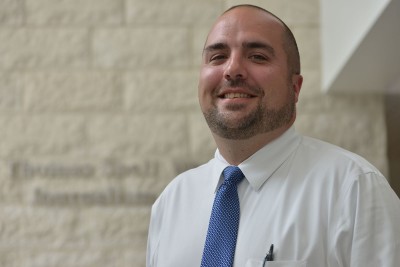
The Journalism and Media Academy (JMA) in Hartford is not your traditional high school, and Dan Pichette ’04 MA, ’11 6th Year is not your typical administrator. Nestled between the biology labs and math classrooms at the magnet school are green rooms, a radio station, a TV studio with camera equipment, and audio editing bays. Students are able to take the traditional math, science, English, and history classes while dabbling in electives such as blog writing, animation, and sports journalism, taught by industry professionals.
Pichette, who was appointed the dean of students at JMA this past August, is wrapping up his first year as an administrator. He graduated from the Neag School of Education’s Teacher Certification Program for College Graduates (TCPCG) program in 2004 and the University of Connecticut Administrator Preparation Program (UCAPP) in 2011.
“There is a sense of pride that comes with successfully completing the TCPCG and UCAPP programs,” Pichette says, who taught history at East Hartford High from 2004 up until he became JMA’s dean of students. “The depth of knowledge that Neag professors and staff bring to the programs is unparalleled, blending real life and research together.”
That said, he never expected to end up at a school like JMA. “Twelve years ago while I was in TCPCG, there weren’t many magnet schools; it was still a far-fetched idea,” says Pichette, who recalls members of his cohort at the Neag School having conversations about how these types of schools were on the horizon. “That type of discussion allowed me to see beyond what was the norm at the time, which was the traditional high school,” he says.
Taking the Leap
Pichette saw the opportunity to work at JMA – which had opened its doors in 2013 – and decided to “take the leap.” Despite his lack of experience working in a magnet school setting, Pichette thought back to his TCPCG supervisor, Dr. James Fallon, whose advice Pichette applies to his role at JMA.
“Dr. Fallon brought a lot of insight into how you work in a school system, no matter if it is small or large. He taught me how to handle myself professionally and how to really work through the ins and outs of a school. To this day, I take his words. They were invaluable,” Pichette says.
“I see full circle how dedicated the faculty, staff, and administration are to their students, programs, and alumni at Neag,” he adds. “The Neag School of Education has truly been such a huge part of my family and our history; I couldn’t imagine going any place else.”
Pichette also mentions the value of having learned firsthand about Positive Behavior and Intervention Supports (PBIS) from Neag School Professor George Sugai. “The resources that UConn brings are tremendous,” says Pichette, who serves as chair of the PBIS committee at JMA. “I got to learn about PBIS from the guy who created PBIS – how can it be better than that?”
Shaping a Progressive Curriculum
At JMA, students have access to a wide array of technology and media courses that can provide a competitive advantage during this time of media and technology dependence. Aside from the traditional courses like math, science, history, and English, JMA also has themed courses such as TV Production, Radio Production, and Digital Storytelling.
“We hope to draw people to JMA through the variety of thematic programs, which give students the opportunity to specialize in a field tailored to their interests and passions,” Pichette says. “We are constantly monitoring the needs of our students and adjusting to ensure that our students have access to the best educational opportunities in the state, and even in the nation.”
JMA also provides students with hands-on experience working in media production, both written and broadcast. The school partners with the Connecticut Public Broadcasting Network (CPBN), which offers students in their senior year the chance to work alongside industry experts at CPBN’s satellite campus to create a professional media portfolio. Going forward, Pichette says he would also like to “work with area colleges and universities to develop a progressive curriculum that suits the ever-changing needs of the students in a media-focused school.”
In addition to its media-related focus, JMA brings together a diverse student body, with students hailing from 43 different districts in the state. “These students represent a myriad of cultures, ethnicities, and socioeconomic statuses,” Pichette says. “We strongly believe that the city of Hartford and the suburbs of Hartford can grow with each other, and build on positive experiences to have a community that continues to flourish.”
‘Driver of Change’
Although he misses the kinds of connection he had with students as a classroom teacher, Pichette says his first year as an administrator offers an education all its own. “I’m still learning; I’m learning every day,” he says. “Every day I walk in here, I’m faced with a something new I hadn’t been faced with before.”
Serving in a role at JMA that he says is similar to that of an assistant principal, Pichette now focuses on teacher evaluations, student discipline, and policy. “It’s been really refreshing to sit and have conversations with teachers about their work and to share my experiences with them,” he says. “I’ve been working with first-year teachers – just sharing some of the strategies I’ve used that worked when I was a teacher.”
Ultimately, Pichette says, he would like to become a principal. “I would like to move into that role, to be able to be the driver of change,” he says, looking forward to the opportunity to spend the summer being a part of the planning process for the next academic year.
“We’ve made some really great strides this year, but we want to keep that ball moving and keep the quality of the education as our No. 1 priority,” he says.
 Facebook
Facebook
 Twitter
Twitter
 LinkedIn
LinkedIn
